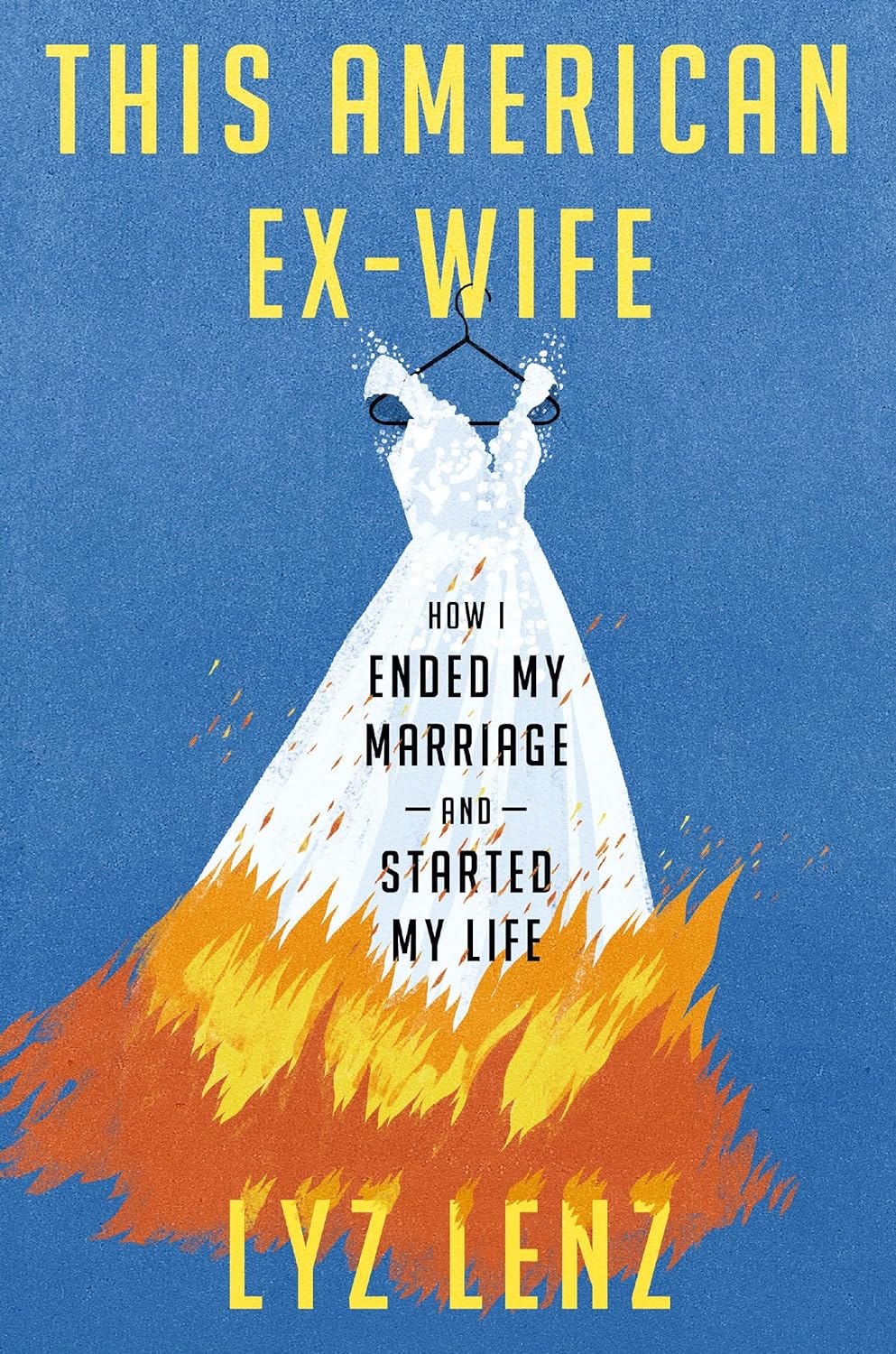An interesting and kind man asked me to marry him this week. It was half-a-joke, half-perhaps-not. This is generally the kind of proposal I get. A poke proposal. I have many theories on why men poke me, but we can save it for another forum.
My reply was (too?) swift, “Oh no, no one in my family does weddings.” As though this practicality was the issue.
It led to a discussion about the institution of marriage that covered much of what we’ve been discussing here the past few months. I know there are a lot of new subscribers here (welcome 😊!!) . If you want to catch up, a month or two ago I shared how one study about American happiness had spawned an overgrowth of rants by predominantly old white men arguing the case for women to get married. Awkwardly, one such rant was by conservative columnist David Brooks who I interviewed on Wild at the end of the year on a separate matter.
Several more such rants have emerged since, including one in the Washington Post, this time penned by the editorial board and arguing that women should compromise their political affiliations and.. just go get hitched already. Women of “marriageable” age tend to lean Left, while men start to skew Right from their thirties onwards. The article specifically suggests Democrat-voting women should suck up a bloke’s Republican tendancies.
It’s a fascinating phenomenon (as I flag in my previous write-up, these kind of rants emerge in times of economic and political flux). And I thought it was well worth revisiting given the US presidential race has now kicked into gear with the Iowa caucus landslide this week and America the world is about to go through some horrifically polarising times.
Author Lyz Lenz over at Men Yell At Me has stayed on top of the phenomenon and recently wrote a counter to what is a worryingly regressive argument that makes causation claims where there are none, based on research done by organisations with vested interests. Sigh. She’s in a good position to do so - she was married to a Republican and has a new book coming out on the subject, This American Ex-Wife: How I Ended My Marriage and Started My Life available from the 20th of February 2024.

Lyz kindly agreed to share her article here on This is Precious. It’s a long, detailed read but I reckon you’ll love how it’s jam-packed with the kind of data you often wish you had at hand when having gendered discussions. I’ve found myself sharing a bunch with FWNTHI (friends who needed to hear it) this week, such as:
When people get married, husbands add seven hours of domestic labor per week for their wives. Meanwhile, a wife reduces her husband’s labor by an hour a week.
There is a lot of evidence that supports the idea that divorced women are happier. Even more evidence that suggests single women are happier than their married counterparts.
Single mothers have more leisure time and get more sleep than their married counterparts.
Read on for more…Oh, and in my original post I pull apart the arguments (repeated below) that marriage makes people happier. For anyone planning on poking me with a marriage proposal, you might find it helpful, too. Here’s the video post again:
Q: What do you think of marriage?
Liberal women - don’t marry Republican men (trust me, I know)
This past week, the Washington Post editorial board decided to dedicate an entire column to the real danger facing America. And no, it isn’t the childcare crisis, or women dying in childbirth while states are rolling back reproductive rights. It is not hate crimes against trans people or the persistence of systemic racism. It isn’t the rollback of LGBTQ rights and it isn’t book bans. It’s the fact that white liberal women are refusing to partner with conservative men.
That the editorial board sat down and decided that liberal women refusing to marry conservative men and the subsequent “collapse of American marriage” was the issue that they wanted to address is telling about the state of anti-feminist backlash in America.
Recently, any number of outlets have published hand-wringing columns about women not dating or marrying men who don’t earn as much as them. The panic on the page tells women flat-out to just compromise, suck it up, marry the men available and love will conquer all.
The Post editorial explains that White Gen Z women are more liberal than White Gen Z men and someone, they conclude, has to give:
This mismatch means that someone will need to compromise. As the researchers Lyman Stone and Brad Wilcox have noted, about 1 in 5 young singles will have little choice but to marry someone outside their ideological tribe. The other option is that they decline to get married at all — not an ideal outcome considering the data showing that marriage is good for the health of societies and individuals alike. (This, of course, is on average; marriage isn’t for everyone. Nor is staying in a physically or emotionally abusive marriage ever the right choice. But, on the whole, while politically mixed couples report somewhat lower levels of satisfaction than same-party couples, they are still likely to be happier than those who remain single.)
The use of the word “someone” here is particularly nefarious, because it’s not just “someone” being asked to compromise. It’s women. It’s women being chided for not partnering with men who do not agree that they should have the right to an abortion, equal pay, a living wage, and childcare for those inevitable children they ought to have. (Because, in case you missed it, there is a moral panic about women not having babies as well.) It’s women being asked to martyr themselves on the cross of heterosexual marriage in order to prop up the status quo.
The column argues that doing so will make people happier. But I don’t think that’s the case.
The column relies on data from the Institute of Family Studies to assert that “on average” married people are happier. But what does “on average” actually mean here? It means men. Men are the ones who benefit from marriage.
In her famous 1991 book Backlash (re-released in 2006), Susan Faludi meticulously goes through decades of data showing that men benefit the most from marriage. Faludi quotes sociologist Jessie Bernard, who wrote in 1972, “There are few findings more consistent, less equivocal, and more convincing than the sometimes spectacular and always impressive superiority on almost every index — demographic, psychological, or social — of married, over never-married men. Despite all the jokes about marriage in which men indulge, all the complaints they lodge against it, it is one of the greatest boons of their sex.”
So if you want to force women to marry someone who listens to Joe Rogan all day and thinks men who are convicted of domestic violence should have access to guns, you need more than a single study from a right-wing institute showing that marriage makes people happier to make your case.
To be fair, not all researchers do agree that men are the primary beneficiaries of marriage. But let’s dig a little deeper.
The Institute for Family Studies is a right-wing organization that was founded to assert the primacy of heterosexual, two-parent households, and has a history of producing flawed research. In fact, IFS is one of the most frequently cited sources on this subject. And I simply don’t believe them.
First of all, even if you accept that the IFS data is accurate (and I don’t), the very premise of the argument is flawed. The data is disproportionately from happy marriages, i.e., those that stay together. People in unhappy marriages are more likely to break up, and therefore not to be counted as “married” in these studies. This inevitably tilts the results.
Additionally, there are a lot of reasons that married people could be healthier, including the fact that health insurance, housing, and taxes are less onerous for a married couple. Rolling two rents or mortgages into one eases a huge financial burden. And lower expenses mean less stress and better health and more money to actually go to the doctor. For many people, marriage means being able to be on a partner’s health insurance plan. Perhaps it’s not marriage itself that is making couples happier, but the way American society privileges marriage and financially punishes adults who live alone.
Let’s look at some other data so often conveniently left out of these conversations about the undermining of American marriage.
Husbands add seven hours of domestic labor per week for their wives. Meanwhile, a wife reduces her husband’s labor by an hour a week.
Almost 20 percent of American marriages involve some form of physical violence. Emotional abuse is even more prevalent.
Women do more child-rearing and more adjusting of their careers to accommodate family and domestic partnership. In her new book, Holding It Together: How Women Became America’s Social Safety Net sociologist Jessica Calarco documents through thousands of interviews with women over the course of many years, the ways that women as wives and mothers are functioning as a social safety net, providing childcare, healthcare, and so much more to their families, often at the cost of their careers, dreams, and livelihoods.
Married heterosexual women are not satisfied with their sex lives.
There is a lot of evidence that supports the idea that divorced women are happier. Even more evidence that suggests single women are happier than their married counterparts.
Single mothers have more leisure time and get more sleep than their married counterparts.
Need more? Women cook more than men — a statistic that’s getting worse, not better.
The bottom line is the institution of American heterosexual marriage is a driver of gender inequality. And marriage is hard even with a loving and supportive partner. So if you want to force women to marry someone who listens to Joe Rogan all day and thinks men who are convicted of domestic violence should have access to guns, you need more than a single study from a right-wing institute showing that marriage makes people happier to make your case.
The Post’s editorial also laments that in seeking partners of their own political orientation, people are selecting for sameness. But it ignores the high stakes of political differences.
What women risk by being partnered with men who don’t share our political beliefs is more than just uncomfortable family dinners. We risk our lives.
Right now, in America, a woman partnered with a man who doesn’t believe she should have full reproductive rights may have to pay for that political divide with her body, her career, and her independence. A woman facing potentially deadly complications from her pregnancy to a conservative man has to negotiate the political divide over terminating the pregnancy with someone who would rather risk her life and her future than abort.
I don’t just want to speak in hypotheticals. I want to tell you what it was like when I was married to a conservative person who didn’t share my beliefs.
Both times I was pregnant, I had genetic testing done on the fetuses without my partner’s knowledge, because I knew that if there were a choice between my life or the fetuses' viability, he would not pick me. And I wanted to pick me.
It meant I kept the knowledge of my own sexual assault to myself for years, burying it deep because I knew he would blame me.
When my sisters were in a devastating car accident and nearly died, one had to declare bankruptcy for having the audacity to live while being uninsured. So, while my sister lived at my house and I took time off from my hourly-wage job to take her to her doctor appointments to learn how to walk again, I also had to listen to my partner blame my family for the financial and emotional costs of one accident.
When I organized a fundraiser that raised over $5,000 for a local nonprofit that offered services to local families, my husband was furious because part of that fundraiser mentioned gay families. So, during the entire six months it took me to plan that event, while pregnant and raising a toddler, I had no help from my spouse because I was “advancing the gay agenda.”
It meant having daily fights over childcare because I was working more. It meant having fights about hiring help with the housework because I wasn’t, in his mind, doing enough, because I was too busy working.
I left before I could find out what would happen if our kids came out as LGBTQ or experiences many of the other very real, very tangible consequences of marrying across the political divide.
Underlying all of this is the assumption that women ought to sacrifice their core beliefs and principles so men don’t have to be lonely or cook their own dinners. In the words of Moira Donegan, “My radical feminist opinion is that if men who are exclusively attracted to women are also incapable of viewing women as social equals deserving of rights and dignity, then they deserve the loneliness that will follow.”
Or as I wrote in my own book: “Women are taught that it is noble to lose themselves inside their marriage. To give up everything for home and children, even themselves. I often wonder how many stories, how many scientific breakthroughs, how many plays, musical scores, and innovations, have been tossed onto the pyre of human marriage.”
If, as the Post’s editorial board asserts, “Americans’ ability to live together, quite literally, might depend” on women sacrificing their autonomy and rights to marry men who believe women are their social and moral inferiors, then maybe our ability to live together should suffer. Maybe American marriage, as it exists, should end. The way we’ve constructed our society is deeply flawed if coming together means I have to sleep next to someone who doesn’t see me as a full partner.
The desire to uphold the status quo, end male loneliness and eviscerate what remains of the social safety net should not take precedence over a woman’s right to protect her peace and happiness by remaining alone. And it should not take precedence over her right to live a full and happy life with someone who respects her, believes in her, and at the very least, gives her an orgasm.
Big thanks to
for sharing her work. I’ll ask her now to join the comments thread.And keep an eye out for her new book, This American Ex-Wife: How I Ended My Marriage and Started My Life available from the 20th of February 2024, cover below.
Sarah xx







Wow Sarah, what a genuinely powerful intelligent article. 👏
Just on the Title - there is also an intonation that women are ‘left’ on the shelf and men are Mr ‘right’ I love that you did that, intentioned or not.
Hey Sarah read your latest email. As usual really interesting and thought provoking. I’m not in the general media stream ( social or otherwise) so am not up with any of the books or studies or commentators that you reference. And am very aware I am white and heterosexual and old blah, blah. However wanted to put in a vote for marriage - without denying or disagreeing with any of your excellent points. No one should do it if they don’t want to. And no one should be made to feel bad to not want to. And it’s undeniable that a huge percentage of marriages are awful ( to be fair for men and women). And yet … and yet I also think it is entirely valid to decide to commit wholeheartedly to one other person for life ( acknowledging that it’s a long shot ) and give it a red hot go with all the compromises etc involved. Terrified that I’ll sound like the other people you mention who rant about this. Life is generally a shit show and no one has the perfect answer but deciding to commit to a partner and raise a family should be held up as one of the good options out there. Only one of them - and not perfect - but still a good option if both partners would like to.
Written and sent in a spirit of love and friendship ( and self awareness that I am probably largely backwardly justifying a 32 year marriage 🤦♂️🤣)
Nigel x
Sent from my iPhone